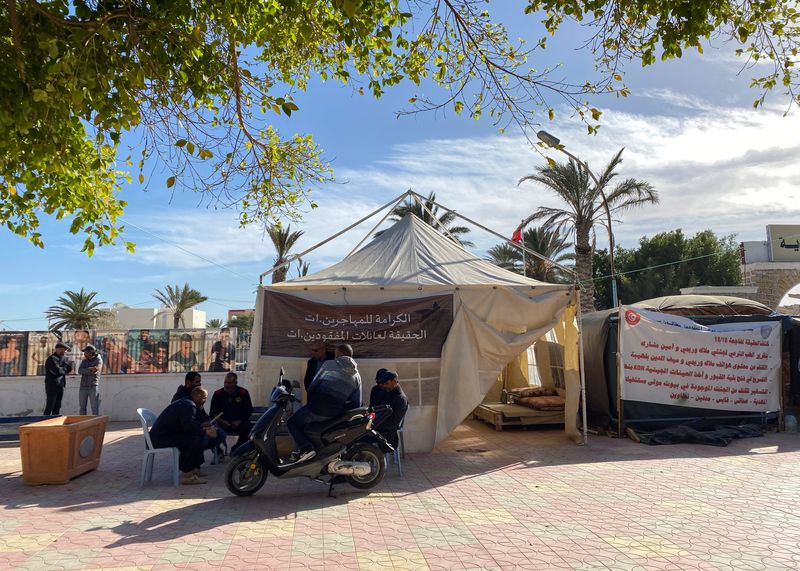By Angus McDowall and Tarek Amara
ZARZIS, Tunisia (Reuters) - Tunisia holds an election on Saturday but, in the coastal town of Zarzis, teenager Ismail Challahki and others like him couldn't care less. All they're waiting for is the chance to risk their lives on another smugglers' boat bound for Europe.
A dozen years after the country's revolution triggered the Arab spring, poverty levels are on the rise and its political system is all but broken.
Saturday's ballot is for a new parliament, but it will have little say under a new constitution forced through this year by President Kais Saied that concentrated power in his hands.
In Zarzis, where street walls bear photos of 18 local migrants lost or drowned in an autumn shipwreck for which townspeople blame Tunisian authorities, nobody Reuters spoke to intended to vote on Saturday.
"I will boycott the elections. I'm not interested in it. Why would I vote? My country gave me nothing," said 19-year-old Challahki, who like most of his friends is unemployed.
Despite the evident risks, he has already tried four times to reach Italy illegally.
When the boat hit bad weather during his first abortive attempt, "people were crying and begging for us to return to Tunisia," he said. "... The waves were very high. For at least four hours it was really bad". Eventually the boat turned back.
The misery in Zarzis, located on the southern coast, has been sharpened by anger over the shipwreck, but elsewhere in Tunisia, the state is failing an increasingly weary and desperate population too.
The economy shrank 8.5% during the COVID-19 pandemic and, as the government seeks an international bailout, shortages have emptied supermarket shelves.
By November more than 17,500 Tunisians had landed in Italy this year, the Tunisian Forum for Economic and Social Rights, an organisation working with migrants said. That compared to a 15,000 for all of last year.
'I CAN'T BEAR TO SEE THE SEA'
President Saied has pledged an investigation into the Zarzis drownings, but locals say nothing has changed.
They say authorities launched no rescue effort and bodies that washed ashore were buried, unidentified, in a cemetery for unnamed migrants.
"I hope nobody feels this pain. I can't even bear to see the sea. My heart is broken," said Salim Zridat.
His 15-year-old son Walid remains among the shipwreck's missing after he, like others, searched through hospitals and morgues to try to identify their children.
The tragedy sparked weeks of protests and bereaved families, some still staging a sit-in outside the town offices, would not vote because they did not think parliament could change anything, Zridat said.
Unidentified bodies from the shipwreck were buried among olive groves in a cemetery for migrants outside the town founded by Chamseddine Marzouk, a local saddened by anonymous burials of strangers far from home.
Marzouk said Saturday would be the first time he would not vote since the revolution.
"The youth that created the revolution did not benefit from it. They have no presence in politics. It was a youth revolution that was failed by old people," he said.
Like other Zarzis residents, Challahki joined the protests in October after the shipwreck - the contrast stark with his own first experience of an attempted crossing.
When he went with his brother and cousin to start their journey it had been like a wedding, he said, with cars in a convoy honking their horns.

Older and perhaps wiser but undeterred by his own subsequent brush with death, Challahki - like others in the town - will try again once he has saved up enough money.
"I want to improve my life and improve things for my family. I'll go anywhere that uses hard currency," he said.